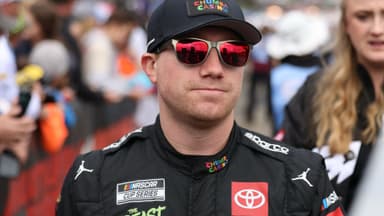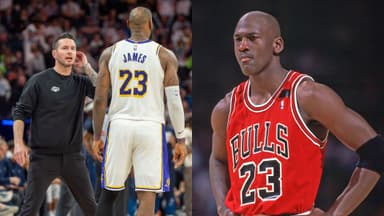If you want to know what kind of gravity Michael Jordan had, you just have to look at his Washington Wizards years. Despite pushing 40, the six-time champion became the biggest attraction in the city, selling out all home games during his two seasons with the Wizards. For his teammates, it was a particularly wild ride as they had never experienced the fanfare that followed MJ.
Advertisement
Bobby Simmons, a guard who was drafted in 2001 (the year MJ returned from his second retirement), witnessed the bright lights that came while standing next to His Airness. He recently recalled his two-season stint in Washington on the ‘Out the Mud’ podcast.
“I was a brand Jordan athlete my entire career,” Simmons told Tony Allen and Zach Randolph. His relationship with MJ helped the second-round pick secure a shoe deal with ‘Air Jordan’ which continued even after the two shooting guards left Washington in 2003. However, it wasn’t just Jordan’s generosity that the DePaul alum touched on.
“It was like rolling with The Beatles. Everywhere you go. And it was fun because, like you said, just watching somebody you grew up idolizing and having the opportunity to be side by side with him…That’s a once-in-a-lifetime chance,” Simmons shared.
Simmons was a Chicago native, so he probably grew up watching Michael Jordan lead the Chicago Bulls to the ultimate glory. Jordan’s connection with the Windy City will remain special of course, but his superstardom was not limited to any one place. Much like The Beatles, MJ was a global phenomenon, and his status was part of the reason the Wizards gave him such a central role in their organization.
Michael Jordan had an unceremonious end to his NBA career
In 2000, a year after ‘The Last Dance’ and Jordan’s second retirement, he became a minority owner in the Wizards and assumed the role of President of Basketball Operations for the franchise.
After just a year in the front office, Mike began itching for more time on the hardwood and returned from retirement for the second time in 2001 to help push Washington over the edge. Though he would average a respectable 21 points per game during his 142 games with the Wizards, his tenure would end without a postseason appearance and worse yet, with some bridges burned.
Abe Pollin, the owner of the franchise, fired Jordan after his second season. He found Jordan’s personality to be abrasive and instead of trying to remedy any issues, he simply asked MJ to leave the franchise. MJ was understandably taken aback by this, as he had committed to Washington despite their poor standing in the league and arguably, had helped progress their rebuild during his 3.5 years in the front offce.
“I didn’t have to do it, you know, but I did it with the benefit of trying to help an organization get back on its feet. And the gratitude that I was being given was, ‘Your services are no longer wanted or needed.’ So I felt like I was being used in a sense,” Mike later reflected on his stint.
Nonetheless, three weeks after the 2002-03 season ended, Pollin asked Jordan to step away from the hardwood, forcefully ending the career of an NBA legend.








